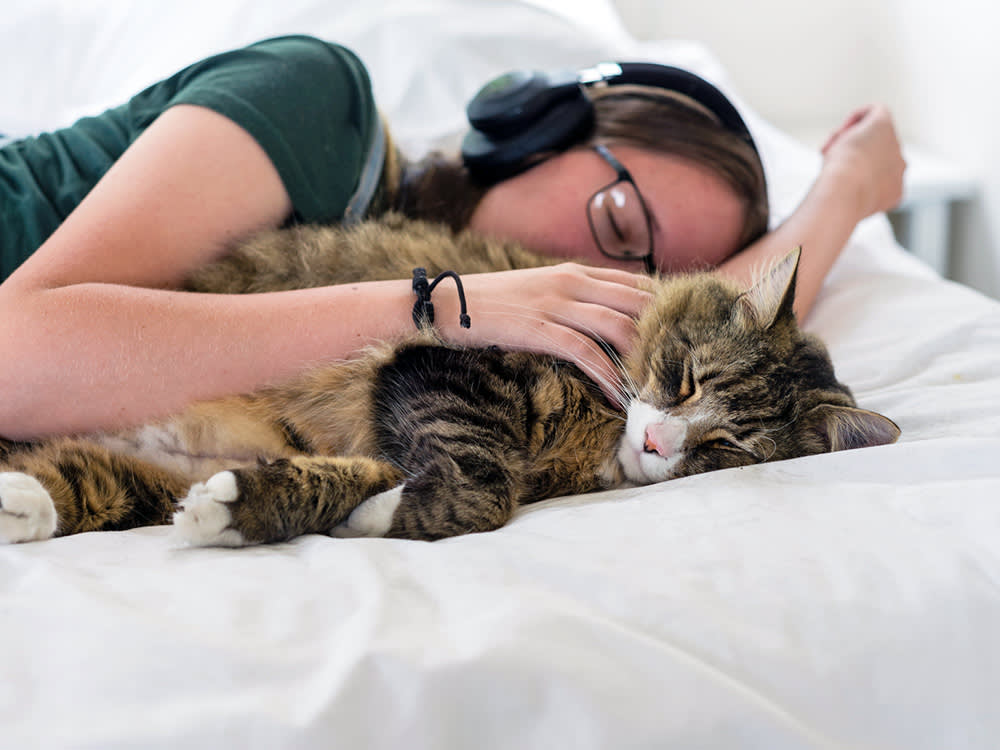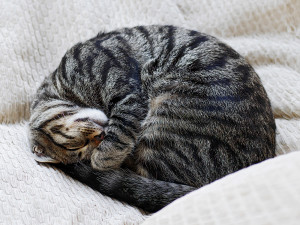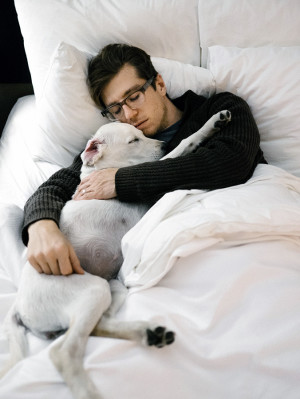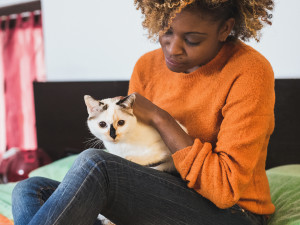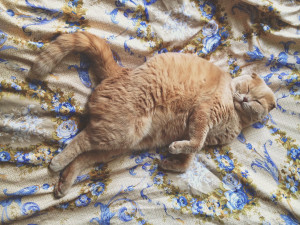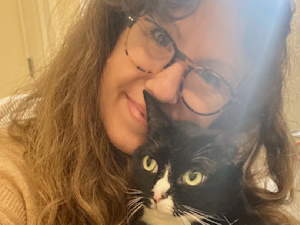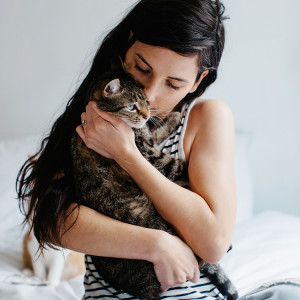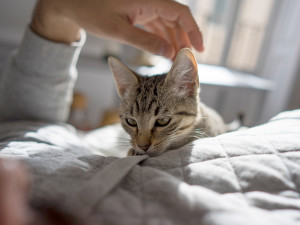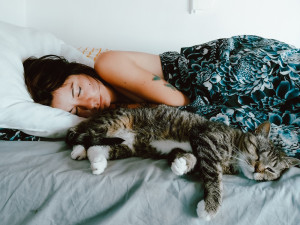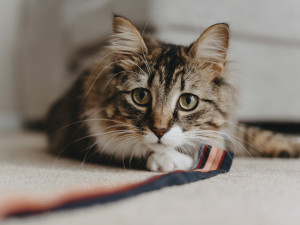Can Cats Snore?
Cats—they’re just like us.
In This Article:
Is it Normal for Cats to Snore? Why Do Cats Snore? How to Stop a Cat from Snoring? When to Bring a Snoring Cat to the Vet Frequently Asked Questions
Cats can do so many things: knock your phone off your desk when you’re not paying proper attention to them, drink water out of your glass right after you’ve filled it up for yourself, headbutt you hard enough to knock you off balance when they think it’s mealtime (again), leave toy mice on your pillow as a token of their affection... Wait, where was I going with this? Oh yes — snoring. Can cats snore, in addition to all their other many quirky behaviors? And is it normal for cats to snore?
The answer is yes, cats can indeed snore. Like humans, cats may snore during sleep due to various factors, such as relaxation of muscles, nasal congestion, or the position they are in. While it might seem amusing, occasional snoring in cats is generally considered normal and harmless.
Normal though it may be, many cat parents find themselves wondering, “Why does my cat snore?” We talked to cat behaviorist Stephen Quandtopens in new tab, CFTBS, founder of Stephen Quandt Feline Behavior Associates, LLC about all things cats and snoring. Why do cats snore? And are there times when a cat snoring necessitates a trip to the vet? Read on for answers to these and other common questions about cats and snoring.
How much do you spend on your pet per year?
Is it normal for cats to snore?
“I like to make the distinction that something can be normal without being common,” Quandt says. “Snoring in cats isn’t particularly common, but it does occur. My cat Cricket snores!” Quandt emphasizes that cat snoring is perfectly normal, unless it indicates a medical problem.
Why do cats snore?
Just like snoring in humans, cat snoring can have many possible causes. Certain breeds of cat are more likely than others to snore, some cats may have allergies, your cat could have a cold, or they could simply be sleeping in an awkward position. Luckily, a snoring cat is much cuter (and less likely to keep you awake) than a snoring human. Keep reading for a few reasons your cat may snore
Anatomy
If your cat is snoring up a storm, the anatomy distinctive to their breed may have something to do with it. “Brachycephalic cats (meaning cats with shortened heads and flat faces, like Persians) are more likely to snore because their smushed faces have bone structures that promote snoring,” Quandt says.
Sleeping positions
If you’ve ever poked a human bedmate to get them to turn over and stop snoring, you already know that sleeping positions can play a part in snoring. Not surprisingly, this is true for cats as well.
“The way your cat angles their neck may lead to snoring, or a change in body position may lead to a quick release of air that comes out as a snore or whine,” Quandt says. “Sometimes, my cat Cricket has a ‘moaning snore’ that combines both a gentle moan and a delicate snore.”
Respiratory issues
Cats can get colds, just like you can. And just like when you have a cold, their runny noses and swollen nasal passages may cause them to snore. If your snoring cat is sneezing, coughing, wheezing, and especially if they seem to be struggling to breathe, it’s wise to give your vet a call and find out if there's a larger issue at play.
Allergies
Again, a cat with allergies may snore, just as a human with allergies does. Sneezing, clear nasal discharge, or wheezing may indicate that a cat who snores is allergic to something. Check with your vet if you think this may be the case.
How can you stop a cat from snoring?
If your cat’s snoring is bothersome, you may be wondering how you can get them to stop. “I love my cat Cricket’s snore, but if I pet her gently, she will usually stop — at least for the time being,” Quandt says. Here are some other things you can try:
Run a humidifier
Depending on the climate where you live, the air quality may impact your cat’s snoring habits. Especially in the winter, when heating systems tend to dry out the air, running a humidifier can be good for cats and cat parents alike. “Dry air can increase snoring, so a humidifier might improve things,” Quandt says.
Put your cat on a diet
While we would never want to body-shame any cat (they’re so cute!), extra weight can contribute to a snoring problem. “Overweight cats sometimes snore — my snoring cat Cricket is a little bit rotund — so losing weight may help,” Quandt says. Diet and exercise, under the guidance of a vet, could result in your cat shedding a few pounds and making less of a racket when they snooze.
Go for a vet visit
It’s never a bad move to call your cat’s vet when you’re concerned about anything health-related, including snoring. It’s possible there's an obstruction or something else easily treatable. “Obviously, if there is a medical problem, like a polyp as an example, removing that or treating the condition should help,” Quandt says.
When should you bring a snoring cat to the vet?
While Quandt makes it clear that he can’t give medical advice (he’s a cat behaviorist, not a veterinarian), he says a few things might warrant a visit to the veterinarian. But you can rest assured that in most cases, snoring in cats is nothing to worry about.
“Generally, if the snore isn’t combined with other symptoms and your cat is sleeping well, then they are probably fine,” Quandt says.
“Coughing, panting, open-mouth breathing, wheezing, heavy breathing, or a swollen face all indicate a medical problem,” Quandt says. “If the cat isn’t getting good sleep, then that also indicates that there is a problem.”
The following all indicate that a call to your vet’s office is in order:
Your cat’s snoring is very loud.
The sound of a cat snoring should be soothing, not earth-shaking. If your cat’s snore is like a truck rumbling past, take a video to show your vet.
Your cat is wheezing.
Wheezing and snoring are not the same thing. A wheezing cat is cause for concern.
Your cat is panting.
Dogs pant to cool themselves off. Cats, on the other hand, don’t pant. Or at least, they shouldn’t, if they’re healthy.
Your cat is breathing with their mouth open.
Heavy breathing, or breathing with their mouth open, is a sign that your cat is struggling.
Your cat is coughing.
A cough might not be anything to worry about (hairballs happen!), but if your snoring cat is also coughing, please get them checked out.
Your cat’s face is swollen.
Poor kitty! A swollen face is a sure sign that your cat is due for a vet visit — even if they’re not snoring.
Your cat won’t eat.
Cats are notoriously picky eaters, but if your cat is on a hunger strike, check with your vet to see what might be going on.
Your cat suddenly starts snoring.
“Any sudden change in behavior is a good reason to check in with your cat’s veterinarian,” Quandt says. “If your cat has never snored before and suddenly starts, give the vet a call to see whether a visit is warranted.”
FAQs (People also ask):
We asked Quandt to address a few common questions from pet parents regarding cats and sleep. Here’s what he said.
Do cats dream?
“If we see cats twitching in their sleep, whiskers, and paws, that’s when they’re dreaming. Most of their sleep is non-REM, and even though they also tend to sleep very lightly, they do have short periods of sleep that are so deep it can be hard to wake them.”
Why do cats wake up so early?
“Cats are crepuscular, meaning most active at dawn and dusk, which aligns with the activity cycles of common prey like birds and mice. In other words, the early cat gets the … meal.”
Why is my cat twitching in their sleep?
“They’re dreaming (see above)!”
